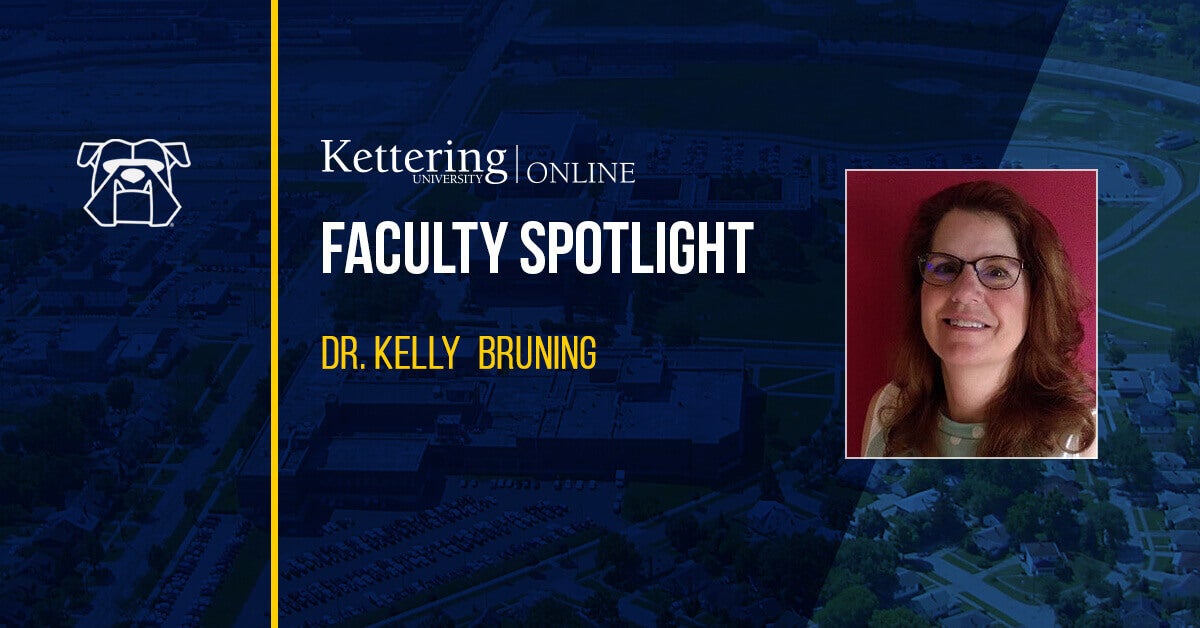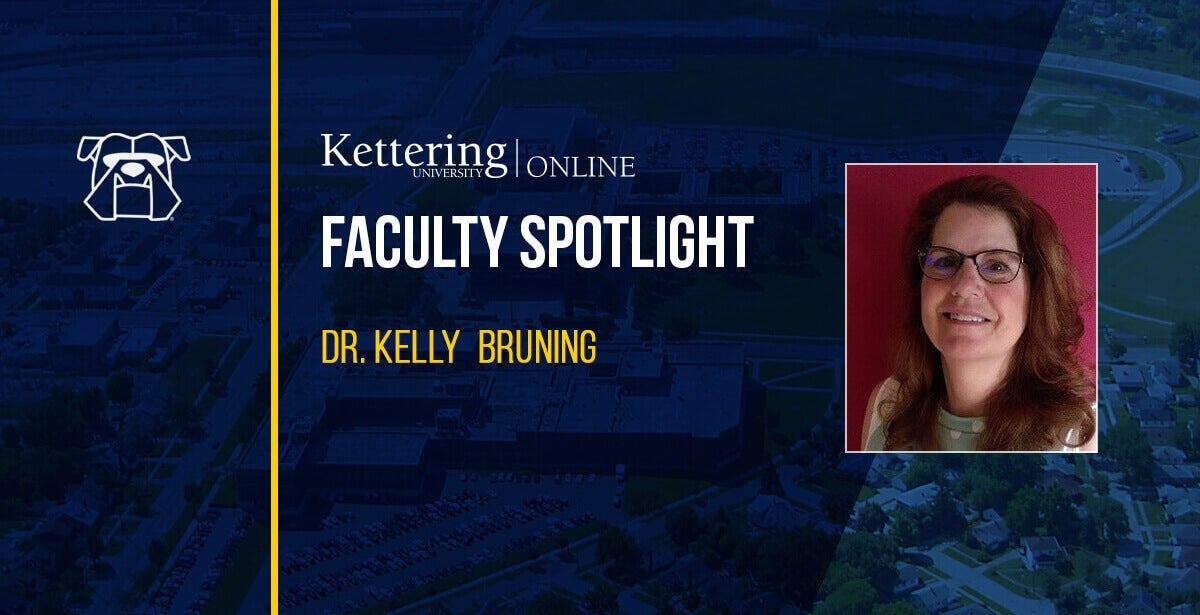
Faculty Spotlight: Dr. Kelly Bruning
As Kettering University Online’s (KUO) Program Development Manager, I have the pleasure of working with Contributing Faculty members. Coming from a wide range of educational, career, and geographical backgrounds, KUO faculty unite in the effort to link transformative experiential education to rigorous academic standards with real-world applications, for learning that lasts a lifetime.
This time, we are happy to shine the Faculty Spotlight on one of our newest Contributing Faculty Members, Dr. Kelly Bruning. Dr. Bruning currently teaches a course in Ethics and Leadership.
Following are excerpts from our conversation:
JL: First, thanks so much for making the time to chat.
KB: My pleasure!
JL: Where did you grow up?
KB: I was born at Chelsea Naval Hospital in Chelsea, MA. I was raised in a suburb of Boston called Hanson, MA. It took 30 minutes to get to Plymouth and 35 to get to Boston. I am also the youngest of seven children.
JL: Which degrees do you hold and from which institutions?
KB: I pursued a “mod” program from Mitchell College, New London, Connecticut, for my Associate in Business Degree, which offered 8-week courses to working adults. I worked full-time from 8-4:30. Then, on Mondays and Wednesdays, I went to my first class from 5-8 pm and my second class from 8:15-11:15 pm. Perseverance was key, and I was determined! Then, I received an MBA from Lake Superior State University and a doctoral degree in Business Management and Organization from Capella University.
JL: Exhausted but determined! In brief, what is your teaching philosophy?
KB: My teaching philosophy is simple: to share what I know with others. Whether in an academic or social setting or through my small business, I have a passion to share knowledge. I’m also not afraid to share my mistakes as an example for others.
JL: How would you describe your Kettering students?
KB: Kettering students are well prepared and self-motivated to put their best foot forward. They like what I like, which is applying critical thinking to modern, real-world problems to find solutions. I feel I provide that sensibility because of my own educational preparation and professional experience. I am an entrepreneur and created my own business. As such, I am able to explain how academic concepts apply in the real world.
JL: You teach the course Ethics and Leadership; how are your students responding to the complex and often contradictory issues related to ethics and leadership in the workplace and in society in general?
KB: It is a dynamic time for us all, and ethics and leadership is front and center in our society and often sensationalized by the media. Students are respectful of one another’s viewpoints. As such, it opens their eyes to others’ views on leadership and ethics. I find that students expect to face ethical issues, and I prepare them for that. They also appreciate the reality that ethics are challenged, to a great extent, in today’s business world. Politics and issues related to COVID-19 seem to be at the top of the subject matter list in discussions on ethics, but I also redirect learners to consider how the concepts apply to business as well.
JL: What are three ideas or concepts you hope your students take with them from the course?
KB: Ok, here they are:
- I let them know that it is not the case of if their ethics will be challenged, but when. Taking the concepts from the class now and thinking of how to apply them now prepares students for how best to react when ethical challenges arise.
- We all have a moral compass. I hope students reflect on their inner-self and ethical code, so they begin to understand and trust their own moral compass while remaining determined to not allow anyone to manipulate it.
- True learning happens when we apply it or teach others about it. Don’t just shove the book in the bookshelf or not use “Dr. B’s bag of tricks,” which are short snippets of real-world wisdom not found in the book. Use them, share them, teach others about them. I often find this is when the student’s “Ah…ha” moment truly happens.
JL: I understand you are a small business owner. Soaps and Such in Alpena, Michigan - How do you demonstrate your ethics in business, and what are your thoughts about applying leadership 'best practices' with your employees?
KB: As a small business owner, I abide by the best business practices. As a member of the Soapmakers & Cosmetic Guild, I sign a code of ethics regarding things such as quality and satisfying regulations. For example, ensuring proper labeling for retail and communicating processes for cleanliness. As an educator also teaching marketing, I believe in truth in advertising. For example, being sure that the benefits of the natural products are communicated clearly to both staff and customers. I practice leadership with employees largely through modeling. I will show them how to do a task, and then I will watch them do it so they can ask questions etc. I also believe in not asking your employees to do what you won’t do. We all do the dishes and shovel the walk. I also encourage my staff to shadow me as I explain products to customers until they get the hang of it. Finally, I model the type of behavior I expect from my employees, from punctuality to quality control to treating patrons as guests. Every person is greeted in my shop regardless of how busy we are making soap (since we craft in the glass front workshop I built, which is inside the retail space – people see their products being made).
JL: What are some of the skills and characteristics employers are most wanting from their employees and why?
KB: Reliability, willingness to learn new things, ability to work with others, punctuality, accountability, pro-active responses, and trustworthiness are what employers look for most above the required academic credentials and necessary skills.
JL: How do you think Kettering Online's programs are meeting those needs?
KB: Kettering Online meets those needs through their policies. Late is late as far as late work goes, and that speaks to accountability. Responding proactively dovetails with being self-directed as an online learner must be in order to be successful.
JL: Share one fun fact about yourself or share some of the things you like to do when you are not teaching or making soap!
KB: I love to fish for whatever has fins! I especially like out-fishing my husband, who taught me how to fish!
JL: Thank you so much for chatting!
KB: Thank you.
KUO honors and appreciates Dr. Bruning for her contributions and highly regarded work with students.
If you are interested in becoming a student, visit Kettering University Online and connect with an Admissions Advisor for information about our graduate degree programs. Our programs are 100% online, ideal for busy working professionals! Learn how you can customize your degree with a choice of Graduate Certificates in Management & Leadership, Lean Principles for Healthcare, Operations Management, Global Leadership, or Supply Chain Management.
If you are interested in corporate, professional and/or continuing education opportunities through Kettering Global X, please consult our catalog at https://globalx.kettering.edu/pages/course-catalog-print

